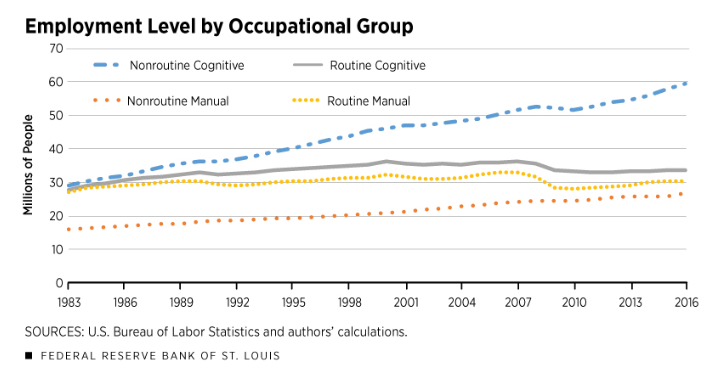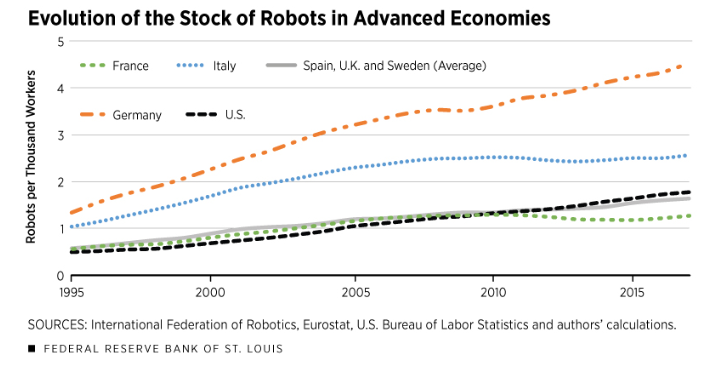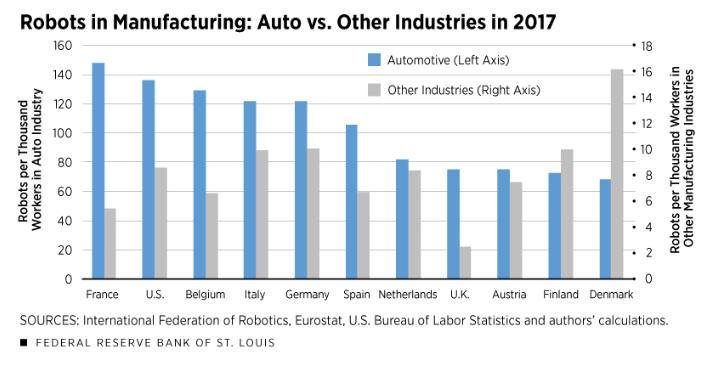 By Tyler Durden
By Tyler Durden
It’s no longer a question of “if” we’re going to all eventually be replaced with robot overlords in the workplace, it’s a question of “when”.
The nuances of how this is going to occur – like which industries are likely to see to the most disruption from automation – were the topic of a new study published by St. Louis Fed Economist Maximiliano Dvorkin and Research Associate Asha Bharadwaj.
The authors found that there has been predominantly a decline in U.S. “middle-skill” occupations as a result of automation. This was despite growth in both high- and low-skill occupations occurring at the same time.
According to the authors, this job polarization is a result of “automation and offshoring, because both these forces lower the demand for middle-skill occupations relative to the rest.”
In the study, the authors looked at two types of work:
- Whether jobs involve routine tasks or nonroutine tasks
- Whether jobs use mostly cognitive skills or manual skills (brain vs. brawn)
They also looked at how the state of employment has changed across these four categories:
- Nonroutine cognitive, which includes management, professional and related occupations
- Nonroutine manual, which includes service occupations related to assisting or caring for others, such as health care support, food preparation and serving, and cleaning
- Routine cognitive, which includes sales and office occupations
- Routine manual, which includes construction, transportation, production and repair occupations
The study found that “employment in nonroutine occupations, both cognitive and manual, has been increasing steadily for several decades, while employment in routine occupations has been mostly stagnant or even declining.”
The authors also honed in on robots used specifically for industrial automation processes.
See: 177 Different Ways to Generate Extra Income
The study found:
Industrial robots are fully autonomous machines that do not require any human intervention and can be reprogrammed to perform several manual tasks. For instance, technologies like tractors or elevators are not industrial robots since they are able to perform only specific tasks and require some degree of human intervention.
And the use of robots in industrial automation isn’t just prominent in the U.S. – industrial robots per thousand workers was higher in Germany and Italy.
“France and the average of the countries Spain, the U.K. and Sweden were ahead of the U.S. in the late 1990s and early 2000s, but in the last decade, it seems that the U.S. has overtaken these countries,” the study found.
Arguably the most important finding, however, was that the automotive industry – an industry already being ravaged by recession and job cuts – is seeing the highest distribution of robots out of all industries.
The study concluded: “Clearly, the automotive industry is by far the largest user of robots, in the U.S. as well as in other advanced countries around the world. For instance, in 2014, the automotive industry accounted for around 54% of the total U.S. stock of robots. For Germany, the share was higher, at around 60%.”
It’s just another brick in the wall of the worsening picture if you are dependent on the automotive industry, which has collapsed globally over the last 18 months, take make your living.
This article was sourced from ZeroHedge.com
Subscribe to Activist Post for truth, peace, and freedom news. Follow us on SoMee, Flote, Minds, Twitter, and Steemit. Become an Activist Post Patron for as little as $1 per month at Patreon.
Provide, Protect and Profit from what’s coming! Get a free issue of Counter Markets today.




Be the first to comment on "The Rise Of Robots Is Crippling Jobs In The Already Recessionary Auto Industry"